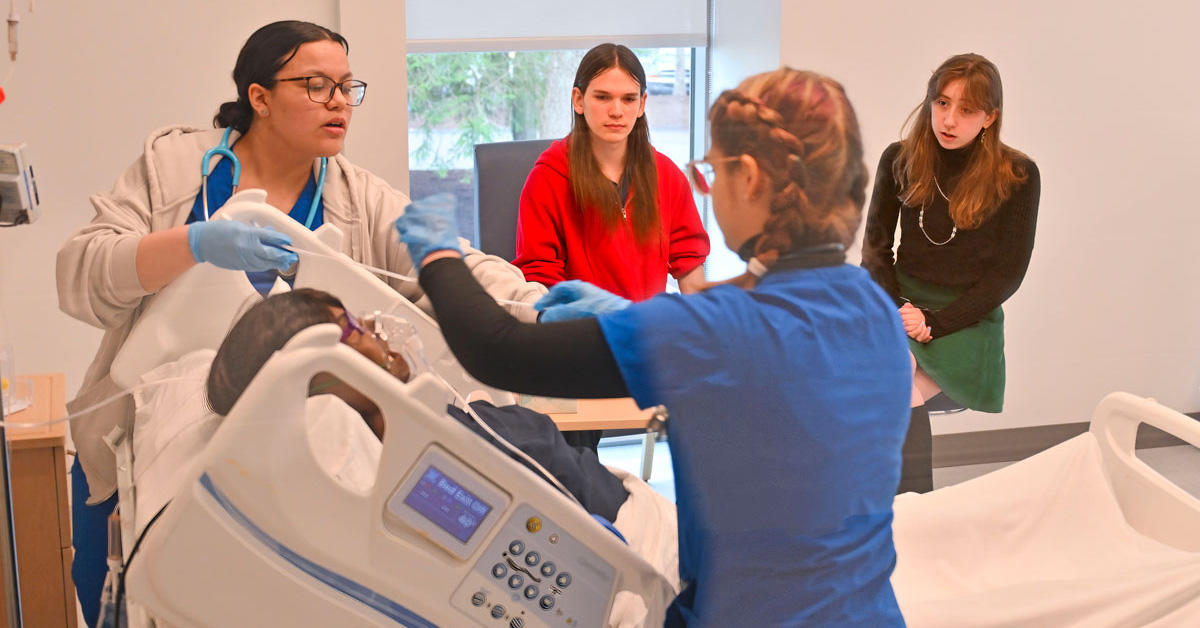Acting for health

Student actors provide authenticity to nursing program simulations
This spring, aspiring actors and nurses are honing their skills together in Wheaton’s clinical simulation center.
The scene resembles the setting of a hospital room. Nursing students introduce themselves to a patient (a manikin) and set about their work while the patient’s relatives (student actors) look on, asking questions and offering information.
For the nursing students, the goal is to accurately assess the patient’s needs and begin treatment while attending to the patient’s family. The actors’ objective: create the history, personality, physical findings, and emotional structure and response pattern of simulated patient cases, improvising as needed.
Overseeing the simulations, Lori Martone-Roberts, professor of the practice of nursing and director of simulations, said the acting students involvement more closely resembles the multitasking nature of nursing practice in real-world settings.
“By integrating student actors into simulations, we can offer our nursing students a more dynamic and realistic experience,” said Martone-Roberts. “These student actors can provide a deeper level of engagement and realism than manikins alone. They bring a sense of unpredictability, making scenarios more authentic.”
Gaily Byerlee ’27, a nursing major, agrees.
“It’s helpful to have the students playing the family members,” she said. “It adds pressure to the situation, but it prepares us for the real world. It’s great to practice balancing communication with the visitors while caring for the patient.”
While student nurses are developing their medical and communication skills, student actors are gaining valuable exposure to a field that they might not have known existed.
“Simulation acting is becoming a rapidly growing area for actors to get regular work,” said Jay Forcello, affiliated instructor of theatre. “Having a course that specifically shows experience in doing medical simulation is a pretty bright light to a potential employer.”
Professional standardized patient actors (SPA) are educated to assist in the training of health care workers. Forcello has worked as a SPA since 2020 and has served as an instructor for various programs in Rhode Island.
Considering a major in either theatre or philosophy, Angus Larson ’28 shared what he has gained from the acting course. “It has helped me a lot, especially the simulations—acting in a way that is different from the theatre,” he said. “It makes me listen and think about what to say instead of just reciting lines.”
Furthermore, the acting course has opened the eyes of Sydney Esper ’28 to a new possibility.
“Learning from professionals in the field and participating in simulations has given me a good understanding of how to move forward in my career,” said the theatre and music major. “Getting feedback helps me gauge what I need to work on. Overall, I enjoy the work and the experience and I’m considering going into this field after college.”
Martone-Roberts is pleased with the reciprocal partnership and looks forward to the future.
“I believe that this collaboration will continue to grow and be enhanced,” she explained. “Looking ahead, I see potential for integrating these student actors into more scenarios, exploring how they can participate in reflective debriefing sessions to offer feedback on how the nursing students interacted with them. This is an exciting area of growth, and I strongly believe it will continue to evolve in ways that will benefit both nursing students and student actors.”
